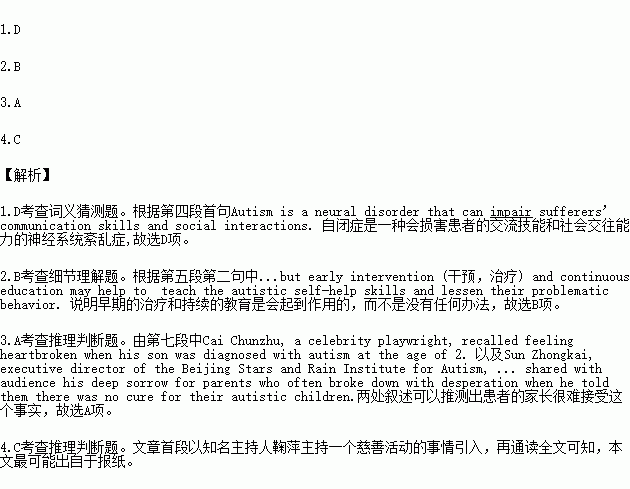题目内容
Celebrity TV presenter Ju Ping has been a host on China Central Television for 30 years, but her recent experience hosting a charity event was one of the most special moments in her career.
On April 2, World Autism (自闭症) Day, Ju partnered with Xia Junqi, a 17-year-old autistic teenager, to host a charity gala at the Beijing National Aquatics Center, otherwise known as the Water Cube.
The event was organized by One Foundation, which aims to increase public awareness of autistic people and their needs.
Autism is a neural disorder that can impair sufferers’ communication skills and social interactions. Sufferers have restricted, repetitive patterns of behavior. It affects about 1.6 million people in China, with medical studies suggesting autism may affect one in every 166 children.
Autism has no cure. For many years it went largely undiagnosed in China but early intervention (干预,治疗) and continuous education may help to teach the autistic self-help skills and lessen their problematic behavior.
The gala(晚会) featured autistic children singing, dancing and performing, and was greeted with enthusiastic applause from the audience.
Cai Chunzhu, a celebrity playwright, recalled feeling heartbroken when his son was diagnosed with autism at the age of 2. He says his family struggled to accept the reality but finally made peace with the diagnoses in the past four years. He says the boy lives in his own world and is trained in an intervention facility. Sun Zhongkai, executive director of the Beijing Stars and Rain Institute for Autism, one of the earliest intervention facilities for autistic children in China, shared with audience his deep sorrow for parents who often broke down with desperation when he told them there was no cure for their autistic children.
Over the years, Chinese society has become more supportive of autistic people and their families, but there are still challenges in terms of getting autistic people employed and looking after them when their parents pass away.
Actor Zhou Xun also called on society to show greater understanding and support toward autistic children and their families.
1.The underlined word “impair” in Paragraph 4 most probably mean?
A. cause B. improve C. increase D. damage
2.Which of the following statements about Autism is FALSE?
A. It is a kind of illness that cannot be cured.
B. Nothing can be done about it.
C. People in China were not well aware of it in the past.
D. A lot of children suffer from it in China.
3.What can we know from Paragraph 7?
A. It is quite difficult for parents to accept that their children have autism.
B. Training in an intervention facility can stop children with autism living in their own world.
C. There is only one intervention facility for autistic children in China.
D. Doctors often break down when they tell parents their children have autism.
4.Where does this text probably come from?
A. A TV interview. B. A medicine magazine.
C. A newspaper. D. A book review.
 海淀黄冈名师导航系列答案
海淀黄冈名师导航系列答案

 of Wenzhou.
of Wenzhou.